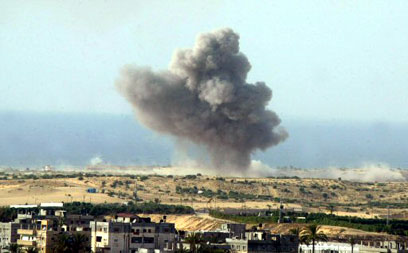_a.jpg)



Ministers to demand wider operation in Gaza
National security cabinet to convene Wednesday morning to discuss further steps against Hamas, Islamic Jihad. Prime minister believes airstrikes in northern Strip are working, but most ministers to demand IDF enter with additional units, take over key routes and increase pressure on Palestinian organizations
"Gaza is not the West Bank and it will be very difficult to boost the forces if they remain there for a long time," Mofaz is set to say during a meeting which will deal with the further steps Israel should take in order to prevent the launching of Qassam rockets from the northern Gaza Strip, Hamas' strengthening and the weapon smuggling on the Philadelphi route.
Mofaz will be joined by many other ministers, who are not ready to settle for the steps taken in the past two weeks since the escalation. The ministers who support a wider operation in Gaza include Internal Security Minister Avi Dichter, Minister for Strategic Affairs Avigdor Lieberman and Industry, Trade and Labor Minister Eli Yishai.
Prime Minister Ehud Olmert, however, believes that the current policy of targeted airstrikes against Hamas and the Islamic Jihad should be continued, while taking advantage of the entire "target bank" provided to the IDF and the Shin Bet in last Sunday's cabinet meeting.
An aide to Olmert said Tuesday evening that the actions taken by Israel so far were beginning to work. The proof, the aide added, is the fact that only three Qassam rockets were fired from Gaza on Tuesday compared to dozens of rockets fired a day last week.
The Israeli activity in the Gaza Strip and the West Bank, the prime minister believes, is working and achieving three goals: Causing damage to Hamas and Jihad's terror infrastructure, reducing the number of rockets fired and neutralizing international pressure in the event that Palestinian civilians are hurt.
"The prime minister, like the defense minister and the defense establishment, believes that the policy implemented in the past 10 days is yielding results," a source in the Prime Minister's Office said.
Destroy a village or two, cut off their power
There are, however, ministers who believe that harsher steps must be taken. Mofaz, for example, suggests brining in more special units which will operate for a limited period of time inside the Strip, mainly against senior Hamas and Islamic Jihad members.
Minister Lieberman believes that the Strip should be split into three and that IDF should take over the Philadelphi route until a NATO force is brought in to prevent arms smuggling.
Minister Yishai believes that one or two villages should be destroyed after its residents are evacuated, while Minister Dichter believes that the actions taken at the moment are not enough, but refuses to say what he plans to suggest to the cabinet.

IDF airstrike in Gaza (Archive photo: AFP)
Minister Yitzhak Cohen of Shas fears the next stage, in which Grad missiles will be directed to the heart of the city. He plans to suggest a plan which will roll the ball to the Palestinian court.
"We have to prepare a table for them detailing terror activities and their price. If they fire a Qassam at Sderot, we will only give them water two hours a day. If they fire at Ashkelon and its power plant, we will cut off their power. If they try and hit the Karni crossing, we will not allow the transfer of goods to the Palestinians. If they fire at the Gaza vicinity, we will stop supplying petrol. It is unthinkable that Hamas' military industry continues to manufacture Qassams and receives electricity, fuel and water from Israel," he said.
Sources at the Prime Minister's Office said that they were aware of the ministers' demands to widen the operation against terrorists in Gaza and the West Bank.
"We will hear the proposals and discuss them," a source said, stressing that Olmert's stance was that the current policy should continue.
Foreign Minister Tzipi Livni will deal with the international pressure which may be exerted on Israel. Livni will leave on Wednesday for a two-day visit to Europe, where she will meet with US Secretary of State Condoleezza Rice. The two will meet in Vienna following Rice's meeting with foreign ministers of the G8 and the Quartet.
Livni is expected to try and explain Israel's military activities to defend its citizens. She aims to increase the world's understanding for the Israeli airstrikes and the detention operations in the Palestinian territories.
The Foreign Ministry's goal in the current conflict with the Palestinians is to provide Israel with "industrial peace" during the IDF's operations. At this stage, sources in Olmert and Livni's offices noted, Israel is backed by the United States and most Western countries.
"At this stage we are rejecting the Palestinian appeal for a ceasefire. We will continue our military operation as long as it takes in a bid to halt the Qassam fire and the smuggling of weapons and stop Hamas from getting stronger, in order to defend the residents of Sderot and the Gaza vicinity," officials in Jerusalem clarified.















